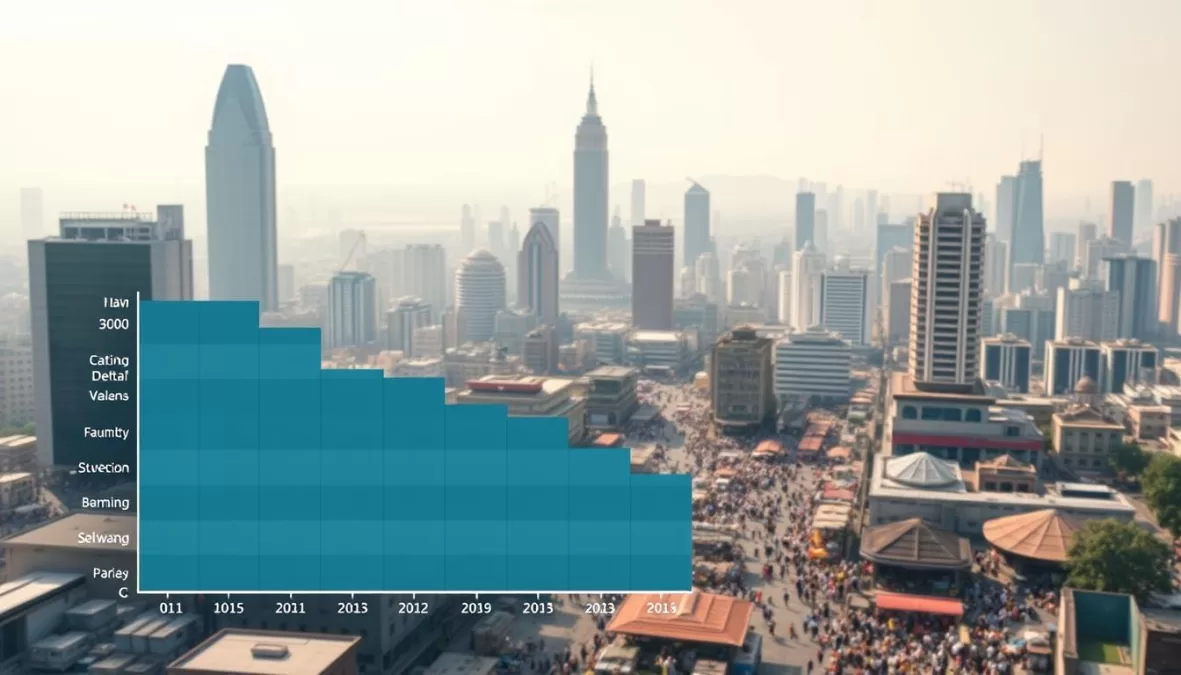India’s job market is evolving fast, driven by economic growth and tech advancements. By 2027, the country is set to become the world’s third-largest economy, creating new opportunities. Fields like AI, blockchain, and fintech are leading this change, offering lucrative roles.
While Gujarat boasts a 93% employment rate, regions like Lakshadweep face a 12.3% unemployment challenge. This contrast highlights the importance of skills development and industry alignment. According to LinkedIn, 82% of professionals plan to switch roles in 2025, yet 55% find job searches tough despite growing demand.
From AI engineers earning ₹11L/year to management consultants making ₹24L/year, this guide explores 10 rewarding careers. Whether you’re a tech enthusiast or a business strategist, there’s a path for you. Let’s dive into the roles shaping India’s future.
Key Takeaways
- India’s economy is expanding, with tech-driven fields like AI and blockchain leading job growth.
- Gujarat has a 93% employment rate, while Lakshadweep struggles with 12.3% unemployment.
- Over 80% of professionals plan job changes in 2025, but many find the process challenging.
- Salaries in top roles range from ₹10L to ₹51L annually, with AI and data science dominating.
- Upskilling is critical to securing high-demand positions in emerging industries.
Why India’s Job Market Is Booming in 2025
By 2025, India’s professional ecosystem will be reshaped by emerging sectors and skill demands. The QS World Future Skills Index ranks the country #2 globally for readiness, just behind the U.S. This growth stems from a 6% employment surge in 2024, fueled by digital adoption and economic reforms.
Economic Growth and Industry Trends
EY projects India’s economy to surpass Japan and Germany by 2027. Key drivers include:
- Tech expansion: Digital infrastructure investments boosted IT roles, with AI engineers earning ₹13L/year.
- Green energy: Renewable sectors create 15% more roles annually.
Urban areas like Gujarat (93% employment) thrive, while rural regions face gaps. Compare trends below:
| Metric | Gujarat | Lakshadweep |
|---|---|---|
| Employment Rate | 93% | 87.7% |
| Key Industries | Manufacturing, IT | Tourism, Fishing |
Skills Driving Future Demand
LinkedIn’s report highlights AI literacy and data governance as critical. Yet, 55% of professionals struggle to match employer expectations. TTEC India bridges this gap with 10,000+ courses, focusing on:
- Cybersecurity certifications
- Blockchain development
As technology evolves, upskilling becomes non-negotiable. The future belongs to those who adapt.
Highest Paying Jobs in India: What You Need to Know
If you’re aiming for top-tier earnings, understanding salary drivers across industries is crucial. A Project Manager’s average salary ranges from ₹4L to ₹28L annually, with experience and certifications like PMP boosting pay. Globally, 25M new project managers will be needed by 2030, per PMI.
- Entry-level Data Scientists earn ₹4L–12L, while experts with 5+ years make ₹60L–70L.
- Chartered Accountants (traditional role) average ₹6L–30L, whereas AI Engineers (tech role) hit ₹25L+.
Leadership positions often require advanced degrees. An MBA or M.Tech can elevate your earnings by 40% in fields like consulting or IT management.
Surprising employers dominate niche sectors:
- Bosch IoT for smart infrastructure
- Oxagile in AI-driven analytics
- Auxesis for blockchain solutions
Upskilling pays off—upGrad reports a 66% salary hike for professionals who complete their courses. Yet, competition is fierce: 55% of job seekers struggle to land roles despite high demand.
Growth projections highlight opportunities:
- Data engineer openings will surge 50% by 2025.
- Blockchain developers see 35% annual demand growth.
Artificial Intelligence (AI) Engineer
AI engineers are at the forefront of innovation, shaping how businesses leverage machine learning. From chatbots to predictive systems, these professionals build intelligent solutions that drive efficiency. The field offers exciting roles with competitive compensation for those with the right skills.
What AI Engineers Actually Do
Your day-to-day work might involve:
- Developing algorithms for fraud detection in banking
- Creating recommendation engines for e-commerce platforms
- Building maintenance prediction models for manufacturing
Companies like Bosch use AI for automotive quality control, while healthcare firms apply it to diagnostic tools. Python dominates as the preferred language, used by 78% of Indian tech firms.
Earning Potential and Top Companies
The average salary sits at ₹11L annually, with location variations:
| City | Average Pay |
|---|---|
| Bangalore | ₹10L |
| Delhi | ₹8L |
Top employers include Amazon, Google, and Oracle—all actively hiring AI engineers for their India teams.
Building Your AI Career Path
Start with a degree in computer science or mathematics. IIT Hyderabad’s certification program boasts 89% placement rates. Essential certifications include:
- TensorFlow Developer
- AWS Machine Learning
Career growth typically moves from junior developer to AI architect. Google’s hiring managers suggest focusing on practical projects during interviews—real-world applications impress more than theory.
Data Scientist: The Most Promising Career
With businesses relying on data more than ever, data scientists have become key players in shaping strategies. They turn raw numbers into actionable insights, driving growth across industries like e-commerce, healthcare, and finance. The field offers exciting roles with salaries averaging ₹14.5L annually.
Key Responsibilities
Your work as a data scientist might include:
- Building predictive models for business forecasts
- Analyzing customer behavior for companies like Procter & Gamble
- Cleaning and structuring large datasets for analytics
Unlike data analysts who focus on reports, data scientists create algorithms. TCS and Cognizant offer ₹10L–18L for mid-level professionals.
Salary Range Across Cities
Location significantly impacts earnings. Here’s a comparison:
| City | Average Salary |
|---|---|
| Bangalore | ₹17L |
| Pune | ₹7L |
Hyderabad and Mumbai adjust for cost of living, with salaries ranging ₹12L–15L.
Tools you’ll need:
- Tableau for visualization
- Apache Spark for big data processing
“Our upGrad graduates see a 58% salary hike within a year of completing the Data Scientist Masters Program.”
Emerging niches like NLP specialists are gaining traction, with salaries hitting ₹20L+. Start mastering Python and SQL today to seize these opportunities.
Machine Learning Engineer
From healthcare to finance, machine learning engineers are building the future of automation. They design algorithms that power everything from disease diagnosis to self-driving cars. With an average salary of ₹11L/year, this role combines creativity with technical precision.
Industry Applications
Machine learning drives innovation across sectors. Apollo Hospitals uses AI for early disease detection, while agritech startups deploy CropYield models to predict harvests. In manufacturing, Bosch’s factory automation systems reduce downtime by 30%.
Key tools for production-grade systems:
- TensorFlow/PyTorch for model development
- Kubernetes for deploying ML pipelines
| Industry | Use Case | Impact |
|---|---|---|
| Healthcare | Diagnostic AI | 40% faster test results |
| Agriculture | Precision farming | 20% higher yields |
Career Growth Potential
Startups like Zycus offer rapid promotions, while MNCs like IBM provide structured growth paths. IIT Madras’s online certification sees 5,000+ enrollments yearly, reflecting demand for upskilling.
“Our ML engineers at SAP work on global projects, from supply chain optimization to customer chatbots.”
Future roles will integrate edge computing for real-time IoT processing. Bangalore leads hiring with ₹10L+ salaries, but remote opportunities are expanding.
Blockchain Developer
Blockchain is reshaping how businesses secure transactions and manage data. From finance to healthcare, this technology ensures transparency and reduces fraud. As a developer, you’ll build decentralized systems that power digital currencies, smart contracts, and more.
Why Blockchain Is in Demand
The Reserve Bank of India (RBI) is piloting a digital rupee, fueling demand for blockchain expertise. Public-sector projects by NIC also rely on this tech for secure record-keeping. Industries adopting blockchain include:
- Banking: 45% of private banks now use blockchain for cross-border payments.
- Healthcare: Patient records are stored securely on distributed ledgers.
- Supply Chain: IBM tracks food shipments from farm to store using blockchain.
In India, Hyperledger developers outnumber Ethereum specialists 3:1. Startups and MNCs like Cognizant and Hitachi are hiring aggressively.
| Role | Average Salary |
|---|---|
| Entry-Level Developer | ₹6L |
| Senior Architect | ₹15L+ |
Certifications to Boost Your Profile
Stand out with credentials like Certified Blockchain Developer (CBD). IBM’s DevOps certification also adds value. Focus on mastering:
- Smart contract development (Solidity)
- Cybersecurity for decentralized apps
“DeFi roles in fintech hubs like Bangalore will grow 200% by 2026.”
With the market projected to hit $26.91 billion by 2024, now is the time to build your skills. Start with Python and cryptography basics, then explore niche areas like NFT platforms.
Full Stack Software Developer
Building both front-end and back-end systems, full stack developers bridge the gap between design and functionality. These versatile professionals command an average salary of ₹9L annually, with Mumbai offering ₹8L. As businesses seek end-to-end solutions, demand for these roles grows 25% yearly.
Front-End vs. Back-End Focus
Indian startups show clear preferences in frameworks:
- React dominates with 62% adoption (avg salary ₹5.6L)
- Angular specialists earn 65% more (₹9.2L) but face fewer openings
The MEAN stack (MongoDB, Express, Angular, Node) remains popular for enterprise apps. However, MERN (replacing Angular with React) gains traction for faster UI development. Wipro trains 8,000+ employees annually on legacy system migration to these stacks.
Top Companies Hiring
Barclays and Siemens lead hiring with hybrid structures:
| Company | Base Salary | Bonus |
|---|---|---|
| BNY Mellon | ₹11L | 15% |
| Deloitte | ₹9.5L | Stock options |
TCS requires live coding tests assessing:
- Algorithm efficiency
- Database optimization
- API security practices
“Our DevOps-integrated teams deliver 40% faster deployments,” notes a Wipro project lead.
Gender diversity lags at 22% female developers, but initiatives like Siemens CodeFirst aim to balance ratios. Continuous skills updates remain critical as 70% of projects now require cloud integration.
Product Manager
Behind every successful app or platform is a product manager making strategic decisions. These professionals blend tech, design, and business acumen to create solutions users love. In India, salaries range from ₹6L to ₹38L annually, with Bangalore offering a median of ₹23L.
Day-to-Day Tasks
At companies like Flipkart, product management follows a lifecycle framework:
- Discovery: Research user pain points through surveys and data
- Prioritization: Use tools like JIRA to rank features (70% proficiency expected)
- Launch: Run A/B tests to optimize e-commerce conversions
IT product roles focus on scalability, while FMCG managers emphasize retail distribution. Salesforce PMs, for example, spend 30% more time on stakeholder alignment than tech peers.
How to Transition into This Role
IIM Ahmedabad’s certification program sees 92% placement rates. Common transition paths include:
- Engineering: 45% of PMs have coding backgrounds
- Design: UX skills help prototype ideas faster
“Our AR/VR team hires PMs who understand 3D interfaces—this niche will grow 120% by 2026.”
Master tools like Confluence for documentation and SQL for data-driven decisions. The future demands PMs who can navigate emerging tech like metaverse platforms.
Management Consultant
Solving complex business challenges is what makes management consulting a rewarding career. Whether optimizing supply chains or launching new markets, management consultants shape strategies for Fortune 500 companies and startups alike. Top firms like McKinsey, Bain, and BCG dominate the space, but boutique agencies offer niche expertise.

Typical Projects
Your work could range from Reliance Industries’ digital overhaul to guiding GST implementations for SMEs. Recent high-demand projects include:
- Rural market entry: Designing distribution networks for FMCG brands
- ESG strategy: Helping firms align with sustainability goals (demand up 120%)
MBB firms often test candidates with brainteasers like: “Estimate the number of petrol pumps in Mumbai.” Prep with case studies from ISB or IIMs—their grads fill 80% of Big 3 roles.
Salary Based on Experience
Compensation scales with expertise. Boutique firms pay 20% less but offer faster promotions. Compare structures:
| Role | Big 3 Salary | Boutique Salary |
|---|---|---|
| Analyst (0–2 yrs) | ₹8L–12L | ₹6L–10L |
| Consultant (3–5 yrs) | ₹18L–22L | ₹14L–17L |
| Senior Partner (10+ yrs) | ₹50L+ | ₹35L+ |
“Certifications like Six Sigma boost salary offers by 15%—they signal hands-on problem-solving.”
Bangalore and Mumbai lead hiring, but remote roles are growing. Upskill in data analytics to stand out—it’s required for 70% of projects now.
Marketing Manager
Modern marketing blends creativity with data, making managers the architects of brand success. With an average salary of ₹12L (FMCG sector pays ₹14L), these professionals bridge art and analysis. Companies like HUL and Amazon seek talent who can turn insights into campaigns that drive market share.
Creative Flair Meets Data Rigor
Your toolkit spans two worlds:
- Creative: Amul’s viral campaigns show how humor builds brand recall
- Analytical: Zomato’s team tracks 12+ engagement metrics per post
E-commerce demands A/B testing for conversions, while traditional retail focuses on shelf visibility. Pharma adds compliance layers—all promotions need DCGI approval.
| Industry | Key Skills | Tools |
|---|---|---|
| E-commerce | Conversion optimization | Google Analytics 4 |
| FMCG | Distribution strategy | Nielsen reports |
Where Your Skills Shine Brightest
Tata Motors hires for auto marketing roles requiring rural adaptation—think tractor demo videos. Urban luxury brands prefer metaverse-ready skills. Certification in GA4 boosts salaries by 18%.
“Our Bengaluru team uses sentiment analysis to refine campaigns weekly—it’s transformed our ROI.”
Future-proof your career by mastering:
- Metaverse ad placements (projected 200% growth)
- Regional language targeting for Tier 2/3 cities
Investment Banker
Navigating high-stakes financial deals requires sharp analytical skills and deep market knowledge. Investment bankers advise companies on mergers, IPOs, and capital raising, shaping their growth trajectories. With an average salary of ₹15.8L (seniors earn ₹1Cr+), this career rewards precision and resilience.
Deal Types and Work Environment
Your days revolve around structuring transactions. For Indian unicorns, IPO preparation involves:
- SEBI compliance: Filing draft prospectuses and addressing regulatory queries.
- Valuation models: Tech startups often use discounted cash flow (DCF) analysis.
M&A deals vary by sector. A tech acquisition might span ₹500Cr, while manufacturing deals average ₹200Cr. Goldman Sachs and JP Morgan lead these roles, with teams working 60+ hours/week during live deals.
Entry-Level vs. Senior Salaries
Compensation scales with expertise. Boutique firms offer faster promotions, while bulge brackets provide global exposure. Compare below:
| Position | Experience | Average Salary |
|---|---|---|
| Analyst | 0–2 years | ₹9L–12L |
| Associate | 3–5 years | ₹18L–25L |
| Director | 10+ years | ₹80L–1.2Cr |
“CA/CFA dual qualifications increase offers by 20%—they signal mastery of finance and regulation.”
Future opportunities lie in sustainable finance. Green bonds could grow 300% by 2027, per RBI forecasts. To manage stress, bankers recommend:
- Time-blocking for focused work
- Quarterly digital detoxes
How Location Impacts Salaries in India
Where you work in India can significantly affect your paycheck. Tech hubs like Bangalore offer 34% higher pay than Pune for similar roles, while Chennai falls between these extremes. This gap reflects varying costs of living and industry concentrations.

Metro vs. Non-Metro Pay Scales
Infosys adjusts packages for tier-2 cities, offering 15-20% lower base pay but better housing benefits. Compare these typical ranges:
| Role | Bangalore | Pune |
|---|---|---|
| AI Engineer | ₹10L | ₹8L |
| Data Scientist | ₹11L | ₹7L |
Amazon sets metro-equivalent salaries for remote tech talent in Jaipur and Coimbatore. Their cost-of-living calculator helps negotiate fair compensation.
Remote Work Trends
62% of companies now offer location-neutral pay, according to NASSCOM. BYJU’S hired 300 remote developers last year, proving distributed teams work.
- Manufacturing: Hybrid models combine plant visits with desk work
- IT Services: 60% professionals prioritize flexibility over pay
“Our Pune team delivers equal output at 20% lower operational costs.”
Emerging cities provide balance—lower rents offset slightly reduced salaries. As industries adapt, these opportunities will reshape India’s work landscape.
Skills That Will Land You These High-Paying Jobs
The competition for top-tier roles demands a strategic blend of technical expertise and leadership qualities. Employers prioritize candidates who solve real-world problems—78% rank this as their top hiring criterion. Whether you’re aiming for tech or management, here’s how to stand out.
Technical Skills for Tech Roles
Python remains the #1 language for roles like AI engineering and data science. TCS’ National Qualifier Test (NQT) evaluates candidates on:
- Coding efficiency: Algorithms must process data under tight time constraints.
- GenAI prompt engineering: Crafting precise queries for tools like ChatGPT is now a core skill.
IIT Bombay’s industry-backed certifications validate expertise:
| Certification | Focus Area |
|---|---|
| Advanced AI | Neural networks, NLP |
| Cloud Architecture | AWS, Kubernetes |
Soft Skills for Leadership Positions
Harvard Business Review’s emotional intelligence framework identifies four pillars for leadership success:
- Self-awareness
- Relationship management
“Agile teams outperform waterfall groups by 28% in project delivery—but Design Thinking boosts innovation by 40%.”
Toastmasters training sharpens presentation abilities, while MNCs expect concise, data-driven communication. Pair these with continuous learning to future-proof your career.
Future-Proofing Your Career
The next decade will redefine success with new skill demands and opportunities. To thrive, you’ll need to align with growing industries and commit to lifelong learning. Here’s how to stay ahead.
Industries to Watch
Quantum computing leads the charge with 300% projected job growth. ISRO’s private-sector collaborations are creating roles in space tech, while Mahindra’s EV hiring spree signals auto industry shifts. Other high-potential fields:
- Drone technology: DGCA-certified pilots earn ₹8L+ annually.
- Green energy: Solar and wind sectors need 50,000+ engineers by 2027.
- DeFi: Blockchain developers for financial apps are in demand.
Continuous Learning Strategies
NASSCOM reports 92% of professionals now upskill online. Compare platforms:
| Platform | Completion Rate | Top Courses |
|---|---|---|
| Coursera | 42% | AI, Cloud Computing |
| upGrad | 66% | Data Science, MBA |
Micro-credentials stack into larger certifications—Google’s IT Support Certificate is a gateway to cloud roles. Pro tip: Blend technical skills (Python, TensorFlow) with leadership training for hybrid roles.
“Our EV division hires engineers who’ve mastered battery tech through nano-degrees—it’s the future of mobility.”
Your career resilience depends on adapting early. Start today by exploring emerging sectors and targeted development paths.
Conclusion
Your path to a rewarding career starts with the right skills and mindset. From AI engineering to investment banking, India’s evolving market offers diverse opportunities with salaries reaching ₹1Cr+ for top roles.
Continuous learning is key. Platforms like upGrad and TTEC help you stay ahead in fast-changing fields. Remember, location flexibility expands your options—remote work is reshaping traditional job markets.
As NASSCOM notes, “Tech employment will drive 60% of India’s economic growth by 2027.” Assess your abilities, target high-demand sectors, and start building your future today.





